No Harm to Participants or Minimal Risk to Participants
Constitutional Drafts:
- Criminologists to be cautious to care for subjects from investigations that also cause them harm.
- Young ones are most harmed if exposed such kind of life they were exposed to.
- Actively encourage the professional progression of investigative staff.
- Done by making sure that staff obtains the suitable training, prop up and protection in investigative surroundings.
- Investigation officers be committed to obligation of ensuring that the bodily, social and mental health of a person participating in an investigation is not harmfully distressed.
- Examination officers in a criminal research should struggle to defend the legitimate rights of those they investigate.
- Also include their welfares, sensitivities and confidentiality be defended.
- Researchers should consider carefully about the participants’ security.
- This is especially for those who are susceptible by position of features like era, social class or powerlessness.
- The researchers should to deliberate on whether it is suitable to present information about prop up services or not.
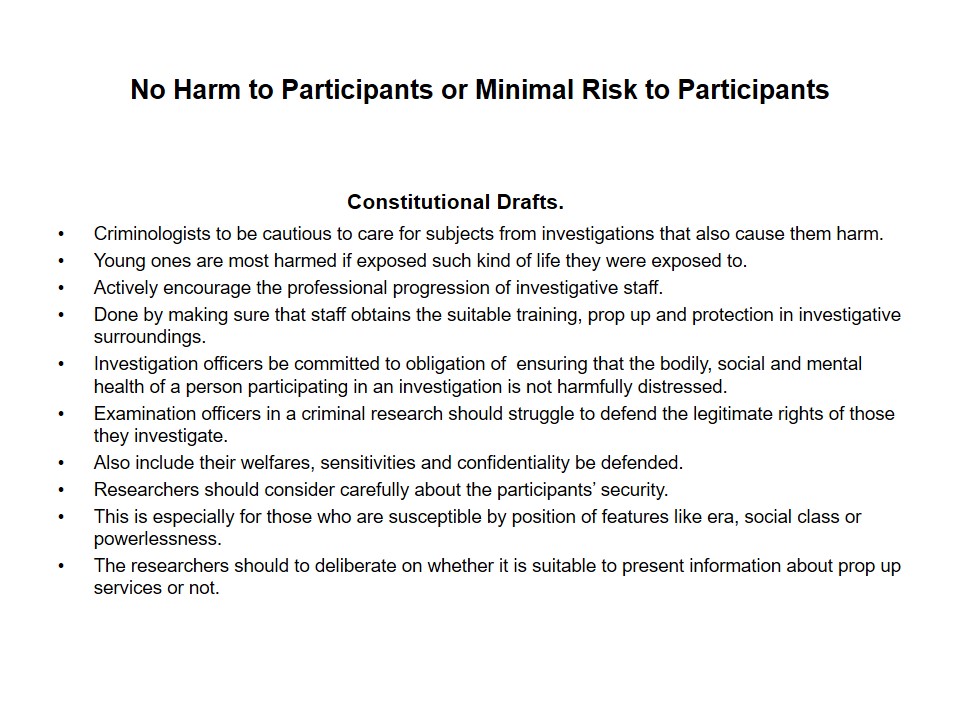
Ensuring Voluntary Participation
Consent Forms:
- Investigation officers to encourage the progression and distribution of information to guard academic and expert liberty.
- Researchers to encourage a working atmosphere and expert associations that are conducive.
- Investigators should encourage free and autonomous investigation into criminological issues.
- Endorse free distribution of criminological information.
- Shun contractual situations that restrict intellectual honesty or liberty.
- Methods used in investigation and research outcomes are open for discussion and peer appraisal.
- Contributors in the research have the right to say no to permission or withdraw from taking part in the research.
- Be done voluntarily at any time and for whatever reason the participants wish.
- Participants’ permission be knowledgeable, voluntary and ongoing.
- contributors have the right to pull out from the investigation at any time and for any cause with no adverse repercussions.
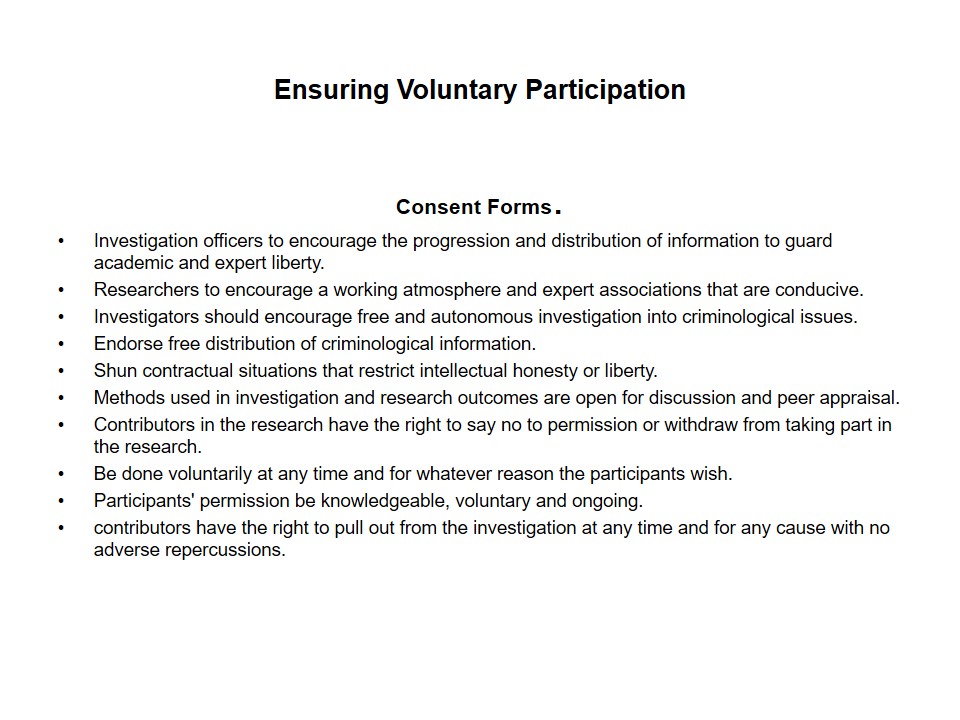
Protecting Anonymity and Confidentiality
Copyright Accords:
- Contributors of the study be conversant with how far they will be accorded concealment and privacy.
- Investigating officers to give special focus to the issues if participation is wanted from kids, juveniles or susceptible persons.
- Deliberation of the necessity for extra permission from a grown-up in charge of the kid at the time involvement.
- The young persons have to be talked to.
- Offer consideration on the matters of kid defense and formulate stipulation for the revelation of mistreatment.
- Reflect on the likelihood of discussing investigation results with contributors and those who are the subject of the inquiry.
- Investigation researchers should not violate the obligation of privacy and not pass on recognizable information to third parties with no contributors’ permission.
- Inquiry officers should perform within the limits of the present legislation over issues like intellectual property.
- This comprise of copyright, trademark and patents.
- The other issues are seclusion and concealment, information guard and human rights.
- Inquiry officials to deliberate on the circumstances in which to reveal information to lawful or other authorities.
- Make such situations apparent to contributors when seeking their knowledgeable permission.
- The possible utility to which the information might be placed should be discussed with inquiry participants.
- Contributors should be told if the information is likely to be shelved in archives or fed into computer records.
- On internet investigation, the researchers should be attentive with the limitations between the communal and the confidential spheres.
- They should also know any lawful and cultural distinctions across jurisdictions.
- If research may prejudice the legitimate rights of respondents, knowledgeable permission be sought from them.
- Researchers should honour pledges of concealment and enhance the safety of information channeling.
- Use meticulous care and deliberation when involving the kids and susceptible persons in internet investigation.
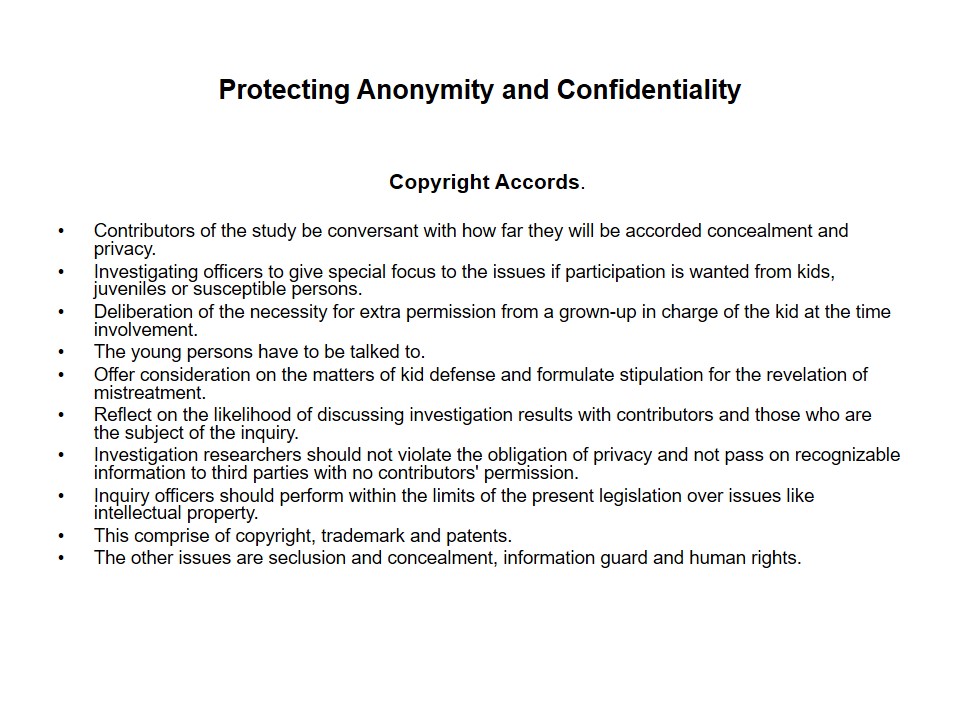
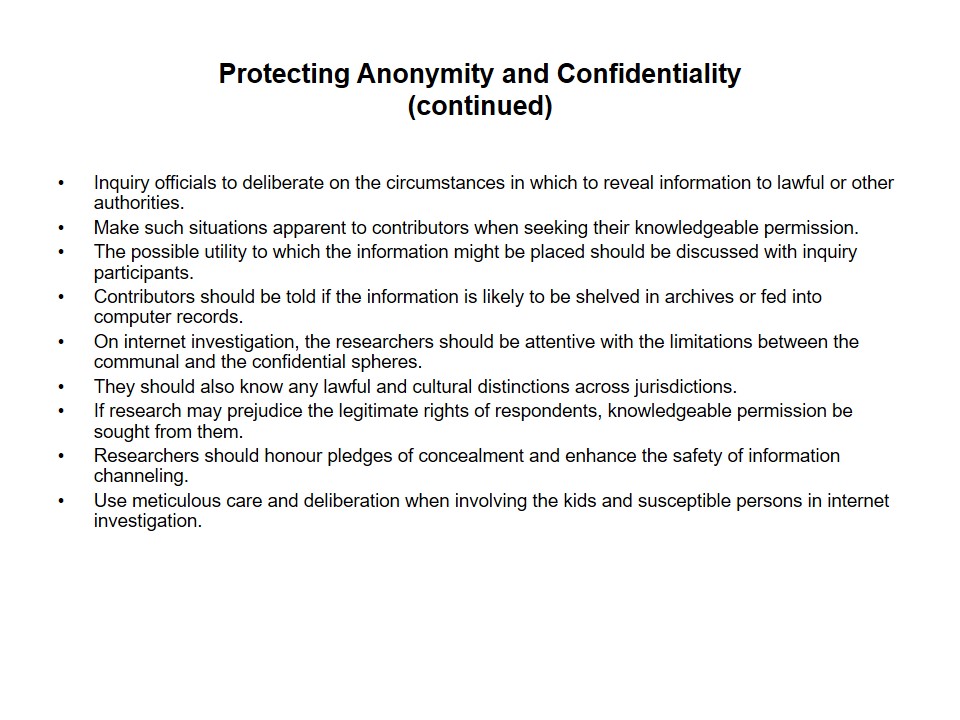
Elimination of Deception for Subjects of Research
Research Design:
- Principles inquired in cases where subjects are misinformed about the intention of the inquiry.
- In most situations minorities are not told about the motive of the inquiry.
- The information they offer might late be utilized to provide evidence on the importance of racial distinctions in offense rates.
- Investigating officers to inform the subjects of the accurate intention of the investigation.
- Such revelations will definitely make investigation more significant.
- Criminologists to take great care when choosing subjects for investigation studies.
- Subjects to be chosen in an impartial and indiscriminate way.
- Researchers should not declare the task of others to be their own.
- The utilization of the work, ideas and research resources of others be quoted at all times.
- Be done regardless of their class and the status of their thoughts or resources.
- The inquiry be based on the liberally offered knowledgeable permission of those investigated in all but outstanding situations.
- Be based on what the investigation is about, who is responsible and funding it, why it is being performed and how the study results are going to be distributed.
- Shun contractual preparations which stress on pace and economy at the cost of high-quality research.
- Look for ways of avoiding limitations on researchers liberty to distribute investigation outcomes.
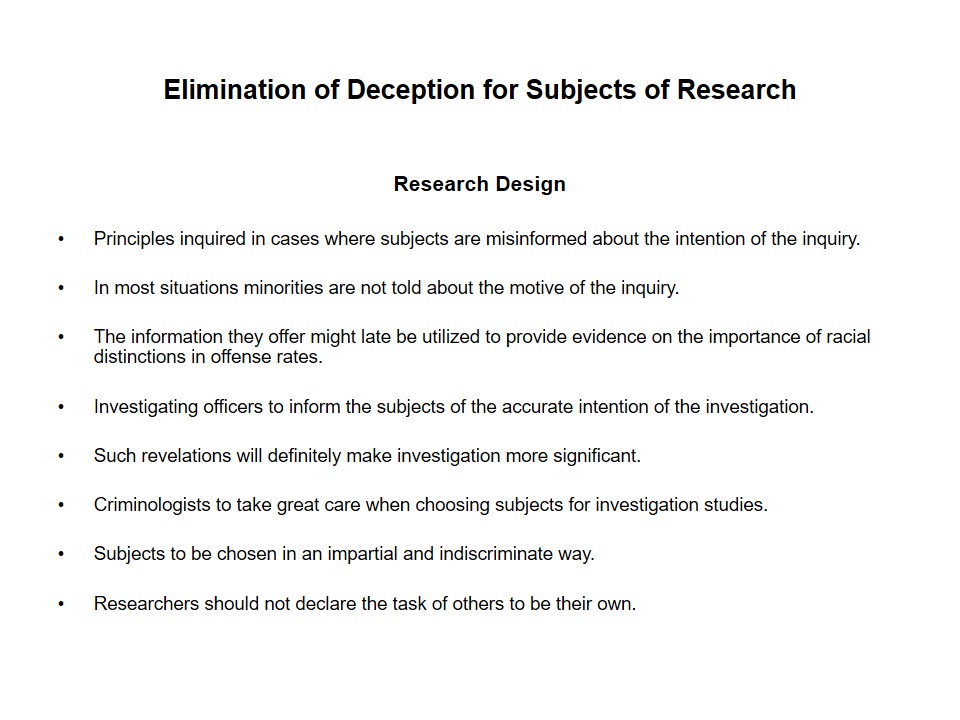
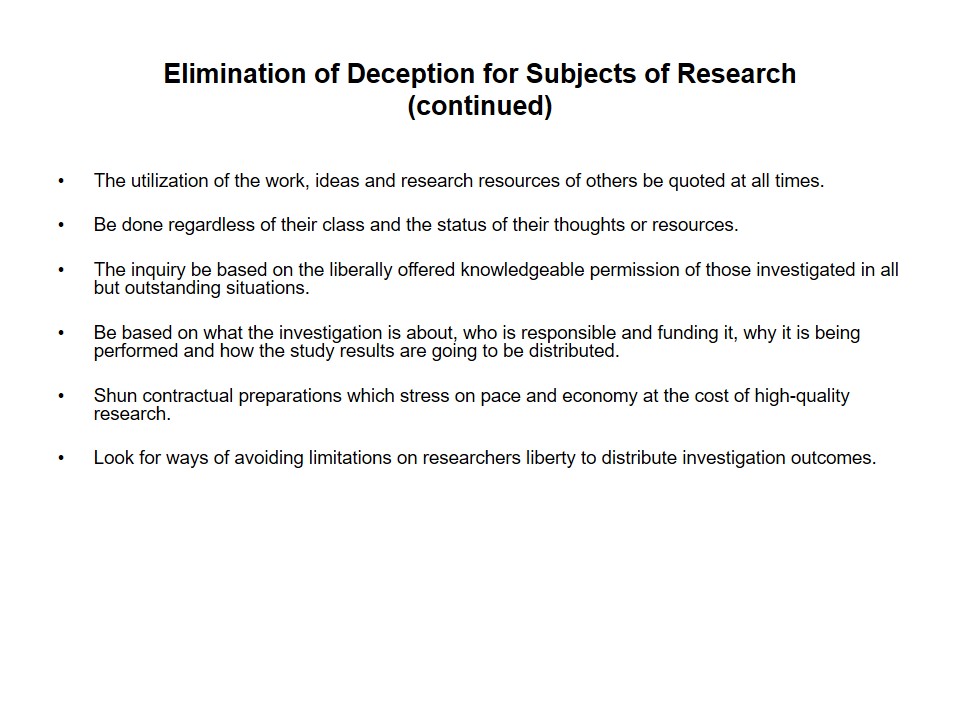
Discovering Staff Misbehavior While Conducting Research
Contractual Agreement Forms:
- Encourage equivalent chance in all features of the specialized job.
- Avoid biased conduct.
- Observe an ethical duty to confront typecasts and pessimistic mind-sets based on discrimination.
- Shun over-generalizing on the foundation of partial information.
- Inquiry officials to be careful of the hazards of failing to show the know-how of certain groups.
- Be aware of the contribution to the over-researching of certain groups within the people.
- Uphold excellent relations with all contributors.
- Researchers should shun harmful confrontations with partakers of research.
- Partakers should know their responsibilities in criminal justice whether contractually described or issue of unofficial accords.
- Participators to finish research inquiries to the best of their capability within contractual or unrecorded accords.
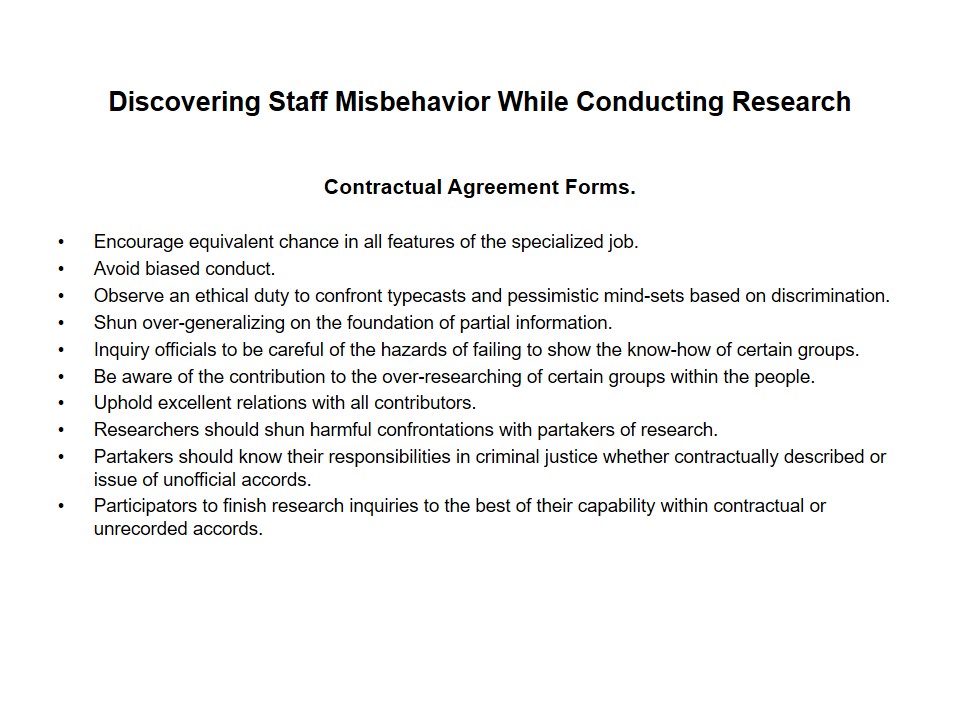
References
- Larry J. Siegel. (2007). Criminology (3rd Ed). Detroit: Wayne State University Press.
- British Society of Criminology. (2008). Code of Principles for Researchers in the Meadow of Criminology. Stanford: Stanford University Press.